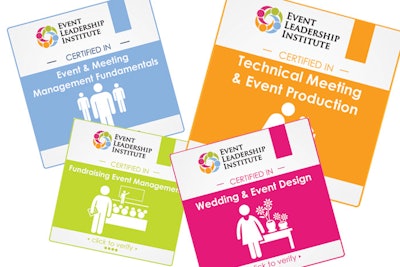
Howard Givner (@hgivner) is the founder and executive editor of the Event Leadership Institute.
Last month, I moderated a roundtable for heads of in-house event departments and one of the main issues to arise was the challenge of proving the value of in-house planners. “Executives in my company still don’t know what we do,” said one person. “They think they could just as well give the work to a secretary.”
This is a common complaint, and not just in the event and meeting industry. Since these executives aren’t going to go out of their way to learn what we do, it’s incumbent upon us to inform them. This is part of the reason we at the Event Leadership Institute developed Digital Credentials earlier this year.
Digital Credentials are based on the Open Badges platform developed by Mozilla, and supported by the MacArthur Foundation and other organizations, as a new way for people to demonstrate, share, and verify skills and accomplishments in the digital age.
How They Work
When someone completes one of our Professional Development Courses, they have the option of taking a remote-proctored, online exam. If they score an 85 or higher, they earn a Digital Credential, essentially a badge icon with our logo and the name of the course.
The secret sauce here is that each credential has unique code embedded in it. People can place these credentials on their email signatures, LinkedIn pages, blogs, websites, or Facebook pages. Anyone who clicks on it is brought to a secure verification page, which lists the person’s name, the date they earned it, what coursework they studied, and what it qualifies them to do.
Benefits to the Credential Earner
For the person who earns the credential, the benefits are obvious: just about anyone you come into digital contact with can learn a great deal about what skills you’ve mastered, with a single click. When that in-house executive sees the level of detail of a given course you’ve completed, they’ll know right away that what you do can’t be accomplished by a secretary.
Benefits to the Employer
For the employer, aside from instant verification, it gives them the ability to quickly see if the material mastered is the right match for their job opening, whether full-time or freelance.
If an event agency is looking to hire someone to manage the production on an award show or an investor meeting, for example, seeing that a candidate earned their Technical Meeting & Event Production credential tells them they covered audio, projection, lighting, staging, slide graphics, and more.
For a corporate recruiter looking for a junior-level event coordinator, the Event & Meeting Management Fundamentals credential shows the person learned about event architecture, strategy, logistics, venue selection, budgeting, and more.
The point is, employers can easily see if what a candidate knows fits what they need.
Digital Credentials by themselves will not solve the problem of proving the value of trained event and meeting professionals. Ultimately you have to show people what you know through the work that you do. But it’s a big step in the right direction, particularly for people who may not have had a chance to work with you in an event capacity.
Interested in earning Digital Credentials? Take a look at the courses the Event Leadership Institute has scheduled this fall here.
Disclosure: BizBash is an investor in the Event Leadership Institute.



















